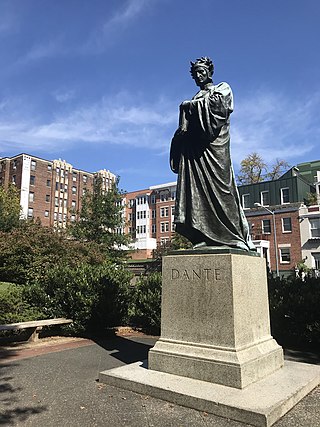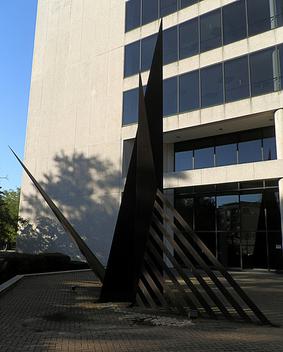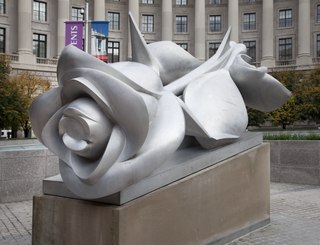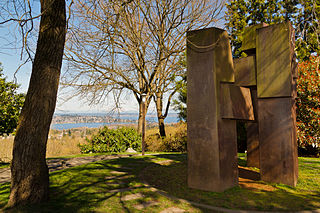
The Hirshhorn Museum and Sculpture Garden is an art museum beside the National Mall in Washington, D.C., United States. The museum was initially endowed during the 1960s with the permanent art collection of Joseph H. Hirshhorn. It was designed by architect Gordon Bunshaft and is part of the Smithsonian Institution. It was conceived as the United States' museum of contemporary and modern art and currently focuses its collection-building and exhibition-planning mainly on the post–World War II period, with particular emphasis on art made during the last 50 years.

The TitanicMemorial is a granite statue in Southwest Waterfront neighborhood of Washington, D.C., that honors the men who gave their lives so that women and children might be saved during the sinking of the Titanic. Ten days after the sinking on April 25, 1912, a group of women formed a committee to raise money for a memorial to honor the sacrifice, with a limit of $1 per person. After sending thousands of cards to other women throughout the U.S., the funds the committee had raised alongside funding from the federal government was enough to complete the project. A competition was announced for a memorial design and several were submitted. The winning design by Gertrude Vanderbilt Whitney, who later opened the Whitney Museum of American Art, became her first major commission.

The Embassy of Australia in Washington, D.C. is the diplomatic mission of the Commonwealth of Australia to the United States. The chancery is located at 1601 Massachusetts Avenue NW on Scott Circle, at the beginning of Embassy Row. The current ambassador is former Prime Minister Kevin Rudd and the Deputy Head of Mission is Paul Myler. The embassy employs more than 250 people.

Dante Alighieri, is a public artwork by Italian artist Ettore Ximenes, located at Meridian Hill Park in Washington, D.C., United States. Dante Alighieri was originally surveyed as part of the Smithsonian Institution's Save Outdoor Sculpture! survey in 1994. The monument is a tribute to Italian poet Dante Alighieri.

General Philip Sheridan is a bronze sculpture that honors Civil War general Philip Sheridan. The monument was sculpted by Gutzon Borglum, best known for his design of Mount Rushmore. Dedicated in 1908, dignitaries in attendance at the unveiling ceremony included President Theodore Roosevelt, members of the President's cabinet, high-ranking military officers and veterans from the Civil War and Spanish–American War. The equestrian statue is located in the center of Sheridan Circle in the Sheridan-Kalorama neighborhood of Washington, D.C. The bronze statue, surrounded by a plaza and park, is one of eighteen Civil War monuments in Washington, D.C., which were collectively listed on the National Register of Historic Places in 1978. The sculpture and surrounding park are owned and maintained by the National Park Service, a federal agency of the Interior Department.

Apotheosis of Democracy is a public artwork by American sculptor Paul Wayland Bartlett, located on the United States Capitol House of Representatives portico's east front in Washington, D.C., United States. This sculpture was surveyed in 1993 as part of the Smithsonian's Save Outdoor Sculpture! program.

Major General Comte Jean de Rochambeau is a bronze statue honoring Jean-Baptiste Donatien de Vimeur, comte de Rochambeau, a French nobleman and general who played a major role in helping the Thirteen Colonies win independence during the American Revolutionary War. Rochambeau joined the French military as a teenager, participating in the War of Austrian Succession, after which he was promoted to colonel, and the Seven Years' War. During the war in America, Louis XVI asked Rochambeau to lead a force of 5,500 French soldiers to assist the fight against the Kingdom of Great Britain. He and George Washington later worked together in the successful siege of Yorktown. He led the Army of the North during the French Revolutionary Wars, but was arrested and almost executed during the Reign of Terror. His military rank was restored by Napoleon and Rochambeau died a few years later in 1807.

Chief Justice John Marshall is a bronze sculpture of John Marshall, by American sculptor William Wetmore Story. It is located at the Supreme Court, 1 First Street, Washington, D.C., N.E.

The Darlington Memorial Fountain, also known as the Joseph Darlington Fountain, Nymph and Fawn, and Darlington Fountain, is a sculpture by C. Paul Jennewein atop a fountain in honor of Joseph James Darlington. It is located at Judiciary Park, where 5th Street, D Street, and Indiana Avenue NW intersect in the Judiciary Square neighborhood of Washington, D.C. The fountain is surrounded on three sides by government buildings, including the United States Court of Military Appeals, the H. Carl Moultrie Courthouse, and the former District of Columbia City Hall.

Don Quixote is a 1976 sculpture by Aurelio Teno located at the northeast corner of the Kennedy Center in Washington, D.C. The sculpture of Don Quixote and his horse Rocinante was a gift from Spain for the United States Bicentennial.

Peter John was a sculpture by artist John Raimondi commissioned in 1978. It was located in front of the new Blue Cross Blue Shield building in Milwaukee, Wisconsin. In 2015, during the conversion of the building into apartments, the sculpture disappeared and its whereabouts are unknown.

Man Controlling Trade is the name given to two monumental equestrian statues created by Michael Lantz for the Federal Trade Commission Building in Washington, D.C. under the United States Department of the Treasury Section of Painting and Sculpture. The works were dedicated in 1942. Each of the two limestone groups is approximately 12 feet tall and 16 feet long.

Past is a 1935 outdoor sculpture by Robert Ingersoll Aitken, located in front of the National Archives Building in Washington, D.C., in the United States. John Russell Pope served as the sculpture's architect and Edward H. Ratti served as its carver. The sculpture is made of Indiana limestone and measures approximately 20 x 8 x 12 feet, with a base approximately 12 x 12 x 15 feet. Past is a companion piece to Present, also located in front of the National Archives Building.

Present, also known as Future, is a 1935 outdoor sculpture by Robert Ingersoll Aitken, located in front of the National Archives Building in Washington, D.C., in the United States. John Russell Pope served as the sculpture's architect and Edward H. Ratti served as its carver. The sculpture is made of Indiana limestone and measures approximately 20 x 8 x 12 feet, with a base approximately 12 x 12 x 15 feet. Present is a companion piece to Past, also located in front of the National Archives Building.

Abraham Lincoln is a marble sculpture of U.S. President Abraham Lincoln by Irish artist Lot Flannery, located in front of the old District of Columbia City Hall in Washington, D.C., United States. The statue is the nation's oldest extant memorial to the president and was installed several blocks from Ford's Theatre, where Lincoln was assassinated. Flannery was present at the theater on the night of Lincoln's assassination.

Sacajawea and Jean-Baptiste is a bronze sculpture of Sacagawea and Jean Baptiste Charbonneau by American artist Alice Cooper, located in Washington Park in Portland, Oregon, in the United States.

Covered Wagon, also known as Oregon Trail Immigrants Memorial and Pioneer Family, is an outdoor 1934 white marble sculpture by Leo Friedlander installed outside the Oregon State Capitol in Salem, Oregon, United States.

Federal Triangle Flowers is an outdoor 1998 sculptural work by Stephen Robin, installed in Woodrow Wilson Plaza, between the Ariel Rios Building and the Ronald Reagan Building and International Trade Center, in Washington, D.C., United States. The installation includes two pieces, one depicting a single stem rose and the other a lily. The cast-aluminum sculptures are set on limestone pedestals; both flowers measure approximately 10 feet (3.0 m) x 14 feet (4.3 m) x 7 feet (2.1 m).

Untitled is an outdoor 1975 sculpture by Lee Kelly, installed at Louisa Boren Park in Seattle, Washington, in the United States. The abstract, welded Cor-Ten steel piece measures approximately 19 feet (5.8 m) x 14 feet (4.3 m) x 10 feet (3.0 m).

George Washington is an outdoor equestrian statue by the Scottish-American sculptor J. Massey Rhind located in Washington Park in Newark, New Jersey. It depicts General George Washington saying farewell to the troops of the Continental Army on November 2, 1783, and was dedicated on the anniversary of that event in 1912.





















